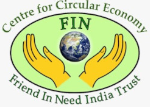Jairaj Gopalakrishnan
FIN Intern – P2 Programme in Collaboration with Fusion Waste Management and Consultancy
One of the most common ways of dealing with waste in India is by simply dumping the waste in open areas and either leaving it to rot or burning these wastes. In the ancient town of Nagda, Madhya Pradesh, the story is not any different. The old trenching ground, Mahdipur, was a waste dump for decades past, up until 2015. This practice had rendered the soil lifeless and the area heavily polluted due to the rotting waste being dumped, becoming a major health hazard.
However, in 2018, Fusion Waste Management along with the help of the local authorities decided to remediate this old trenching ground. They employed the use of heavy machinery to clean up the waste and attempt to rejuvenate the soil. Through consistent efforts, Fusion Waste Management managed to repurpose an old dumpsite and trenching ground into a park
Unfortunately, Fusion’s job is far from over. While efforts to remediate old landfills are to be applauded, it is merely a symptom of the problem at hand. Many Indian cities face the problem of unsegregated garbage being poorly collected and carelessly transported in uncovered trucks just to simply be dumped in sites like Mahdipur. Fusion recognizes the fact that while recycling is great, the objective is to prevent and minimize waste generation in the first place and efforts are being taken in this respect through a multitude of initiatives. Projects like “Ghar Ghar Dastak” in collaboration with local administration helps promote the idea of waste segregation and safe sanitation. Furthermore, incentives (On Spot awards) like being awarded the “Best School”, “Best Hospital” or “Best Restaurant” for waste segregation and cleanliness creates a sense of responsibility amongst the people. Through this, they tacitly understand the significance of their actions and it begins to influence their actions, behaviour and decision-making on a daily basis.
This act by Fusion Waste Management can be replicated in multiple Indian cities, but as mentioned before, it will not be enough to deal with the waste issue on a larger scale. We need to incite behavioral change. This can be done through:
– Generating awareness about waste segregation
– Providing incentives for positive waste management behavior
– Efficient collection and disposal/composting systems
Fusion Waste Management and the state of Madhya Pradesh are taking strides in the right direction and their practices and actions can develop new possibilities for waste management solutions that can be applied, not only in India, but multiple developing countries the world over!
Jairaj Gopalakrishnan
FIN Intern – P2 Programme in Collaboration with Fusion Waste Management and Consultancy

